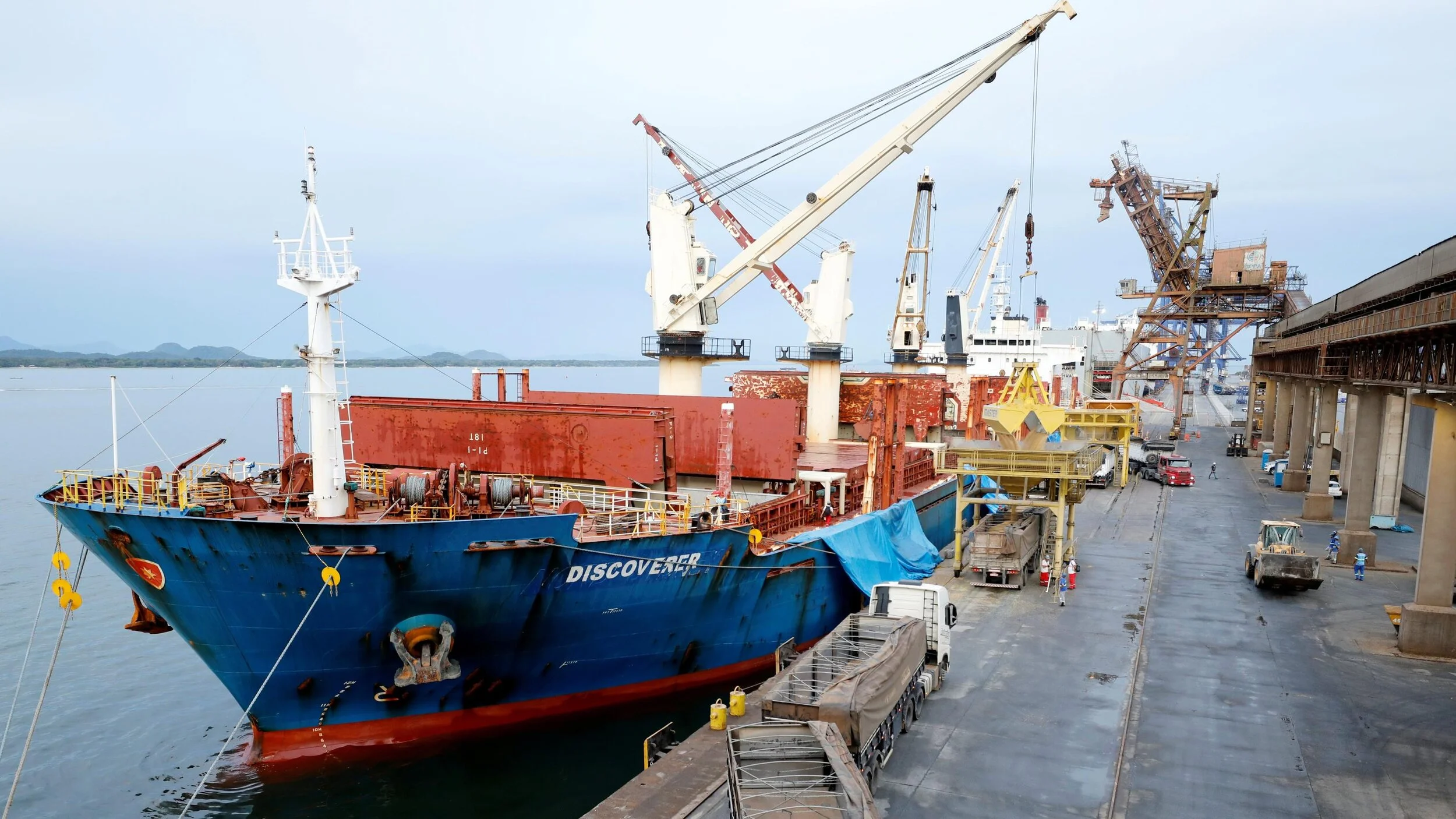How Dredging the Mississippi River Could Uncover $461 Million
Almost half a billion dollars is buried at the bottom of the Mississippi River. A massive effort is underway to dredge the lower Mississippi along its final 250-mile stretch, and the results could provide major financial benefits to U.S. farmers.
At ports along the mouth of the Mississippi, most ships loading soybeans can carry a maximum of 2.4 million bushels, and any additional weight in the hold puts the vessels in danger of scraping the riverbed. However, a mere extra 5' in depth allows a ship to squeeze in 2.9 million bushels, at a small increase in transport costs.
Read More
USTR Told Of Rising Chinese Influence In Latin America
While the U.S. continues to maintain being the primary trading partner with Central American and Caribbean neighbors, heightened Chinese economic engagement with those neighbors concerns several Congressional members. Over a dozen representatives sent a letter to U.S. Trade Representative Katherine Tai asking for immediate attention to the growing influence of the Chinese Communist Party in both Latin America and the Caribbean trade and economic development.
Read More
Clouds On The Soybean Export Horizon?
Soybean exports for the 2021-22 season did not get off to the best of starts with Hurricane Ida ravaging the Louisiana Gulf Coast and causing significant damage to both humans as well as residential and commercial properties in early September.
Several export facilities were closed for a period of time with Cargill’s Reserve elevator perhaps incurring the worst damage. September is of course, a critical month for the ramping up of U.S. corn/soybean exports and re-building the pipeline. Various reports suggested that as much as 45-50% of the Gulf’s export capacity was impaired for the month.
Read More
Ag Trade: Biden, China Plan Virtual Summit By Year's End
Financial Times writers Demetri Sevastopulo and Ryan McMorrow reported on Thursday that, “Joe Biden and his Chinese counterpart Xi Jinping have agreed to hold a virtual summit this year, in the first sign of improving relations between the countries since the US president took office.
Read More
USTR Promises Tougher Stance On China
Monday, U.S. Trade Representative Ambassador Katherine Tai announced the Biden Administration’s plans for a new approach to the U.S.-China relationship, including enforcement of the U.S.-China Phase One Agreement that was signed in January 2020. A series of upcoming bilateral discussions amongst trade negotiators will be scheduled.
Read More
Grain Transportation: Ida Affected Fuel Less Than Exports – DTN
The aftermath of Hurricane Ida continues to affect U.S. corn and soybean exports, causing more than a half-billion dollars in damage to Louisiana agriculture. However, fuel prices have remained steady despite refining disruptions in the Gulf of Mexico.
Read More
US Soy Exports Hit 6-Month High As Gulf Loadings Rise After Ida; Lag Year Ago Pace
U.S. soybean exports jumped last week to a six-month peak, while corn shipments were the highest in a month as Louisiana Gulf Coast terminals steadily ramped up operations disrupted nearly a month ago by Hurricane Ida, preliminary data showed on Monday.
Read More
US Beef Exports Increase, Reflecting Large Shipments To China
In its monthly Livestock, Dairy, and Poultry Outlook report last week, USDA’s Economic Research Service (ERS) stated that, “In July, U.S. beef exports totaled 297 million pounds, exceeding last July’s exports by 17.9 percent or 45 million pounds.
The rise in part reflects large shipments of U.S. beef to China, the largest U.S. beef exports to China, ever recorded, totaling almost 45 million pounds more than the previous year.
Read More
China's Wheat Imports Hit Highest In Two Decades
China's wheat imports hit the highest level in more than two decades. The country is accounting for 19% of global wheat consumption right now.
According to China's customs data, the U.S. supplied 3 million metric tons of wheat imports during the last marketing year, which equates to a 28% share.
Before the 2010/2011 marketing year, the country's typical wheat imports totaled 1 million metric tons or less.
Recently, that amount bumped up to an average of 3.5 million metric tons in most years.
Read More
Momentum Building To Address Ocean Shipping Woes
More than 70 agricultural associations called on President Joe Biden to address ocean carrier practices that are causing increased costs and delays for American businesses. In addition, support continues to swell for a bipartisan House bill to address many of the problems contributing to the port crisis impacting agricultural exports.
Read More
Louisiana Grain Terminal Reopens After Hurricane Ida as Nicholas Rains Arrive
Another grain export terminal near Louisiana's Gulf Coast shuttered for two weeks by Hurricane Ida restarted operations this week even as heavy rains from Tropical Storm Nicholas battered the region on Tuesday.
Global grain trader Cargill Inc said it had reopened its Westwego, Louisiana, grain export terminal and on Monday unloaded its first grain barge since Ida came ashore on Aug. 29 and crippled shipments from the busiest U.S. grain export hub.
Cargill is the latest major grain trader to revive export operations after Ida devastated the region's power grid and damaged some of the nearly dozen grain terminals dotted along the Mississippi River from Baton Rouge to the Gulf of Mexico.
Read More
Asian Crop Importers Brace For Delays After Hurricane Ida Hits U.S. Export Hub
Asia's grain and oilseed buyers are set to face shipping delays of at least one month after Hurricane Ida damaged key export terminals around the U.S. Gulf Coast, two traders and one miller said. The slowdown in supplies is likely to stoke food inflation fears for price-sensitive consumers in Asia, where many importers have already drawn down crop inventories after having been forced to curb purchases amid volatile crop prices and COVID-related supply disruptions this year.
Read More
Coast Guard Opens Lower Mississippi River to all Vessel Traffic
On Sept. 4, the U.S. Coast Guard (USCG) reported that Coast Guard captain-of-the-port, New Orleans, Capt. Will Watson has opened the Lower Mississippi River to all vessel traffic in New Orleans and key ports throughout Southeast Louisiana Friday following Hurricane Ida.
After the successful removal of several power lines obstructing the waterway due to a downed transmission tower near mile marker 106.5 and a survey of the ship channel in key areas of concern, the waterway has been deemed open for all marine traffic, noted the news release.
Read More
Grain Export Flow Expected To Shift From Ida Damage
Grain companies with terminals along the lower Mississippi River are looking at shifting more of their committed grain and soybean exports to ports in the Pacific Northwest while damage assessments and repairs begin in earnest following Hurricane Ida.
Hurricane Ida brought significant wind damage across New Orleans and surrounding areas. The timeframe for resuming operations is unknown due to uncertainty of when electricity will be restored. Officials in some Louisiana parishes say some towns along the coast are uninhabitable.
Read More
Hurricane Ida Shows the Fragility of Agricultural Supply Chains
Hurricane Ida barrelled into the Louisiana coast on Aug. 29, bringing 150 mph (230 kph) wind gusts, torrential rain, and widespread power outages to New Orleans and the surrounding region. It also brought all shipping traffic through the mouth of the Mississippi River to a grinding halt, snarling supply chains at the start of a crucial period for US grain exports.
The US Coast Guard closed the Mississippi to barge traffic ahead of the storm on Aug. 28, and the New Orleans International Airport shut down passenger and cargo traffic on Aug. 29. The Port of New Orleans closed its container shipping terminals on Aug. 30 and stopped all “breakbulk operations,” which refers to moving cargo from large ocean freighters to smaller barges for transport up the Mississippi River.
Read More















